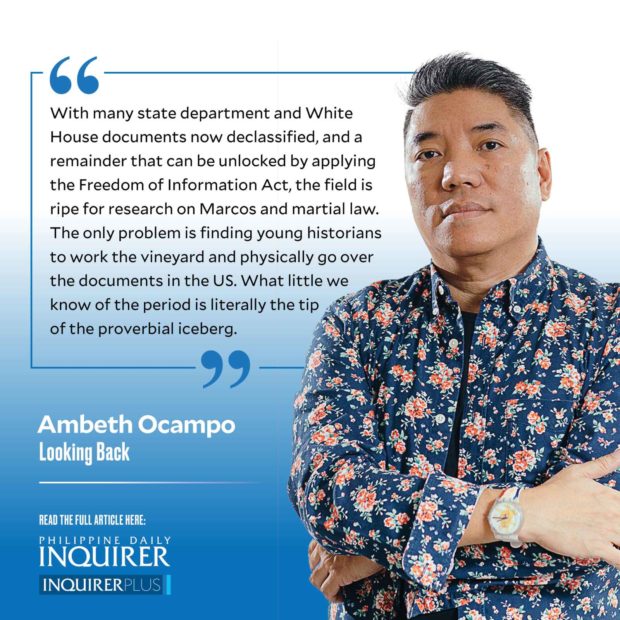Tip of the iceberg
The dean of the diplomatic corps in the US is the most senior foreign diplomat. This is determined not by age but in terms of length of service, from date of arrival in Washington and official presentation of credentials. In the Philippines, we follow a different system: the apostolic nuncio is the dean of the diplomatic corps regardless of age, rank, or length of service. Judging by the way he is treated in Manila, the most important is the ambassador of the United States. That Manila has been without a US ambassador since October last year should make us ask if this is an oversight or an expression of the US relationship with President Duterte in his last months in Malacañang.
As a historian I am interested in US ambassadors who served at turning points in recent Philippine history: Brig. Gen. Henry Byroade who served in Manila during the imposition of martial law and Stephen Bosworth who served during the 1986 Edsa People Power Revolution. Some of Byroade’s reports, available online from the US State Department, makes for engaging reading. He described Marcos in September 1972 as “a chess player, par excellence. It is usually possible to predict that he will choose as his next move one of two or three options that seem open to him — yet we cannot be certain just which one of these the next sealed envelope will contain.” Byroade had exceptional access to Malacañang that changed when Marcos realized that the diplomat he considered a friend was only out to protect US interests in the Philippines.
Marcos’ diary entries from September 1972 can now be compared with Byroade’s dispatches. On Sept. 14, 1972, Marcos met with Byroade after the presentation of credentials of the new Malaysian ambassador. Marcos recorded that they discussed “the parity decision, the Lusteveco [Luzon Stevedoring Corporation] decision as well as the other developments against the Americans.” When Byroade mentioned that US senators wanted to dismantle the sugar quota, Marcos said:
“I told him he might start something that would have no end; and that anyway the sugar industry was ready to lose the quota for the national welfare and sell our sugar in the world market. I suggested that while we in the Philippines were talking of survival, the Americans were talking of property and profits. And we were not thinking on the same plane.”
On Sept. 15, 1972, Byroade reported on this meeting saying that Marcos could extend his term using means permissible under the constitution such as martial law, and did not need US support to do so. He predicted that Marcos would push for the early conclusion of the Constitutional Convention, and a shift to parliamentary rule by 1975. Marcos wanted to know if the US would support or thwart his plans. Byroade recommended:
“We might be in a position to buy considerable benefit to ourselves by simply letting him know that we would not oppose in any way his continuation in power by constitutional means. These matters, we could say, are internal to the Philippines on which we would naturally take no position or action. However, we would want to make clear at the same time the importance we attach to the constitutional legality of these means. All of this, of course, would be quite private, and Marcos would want it that way.
“I am in favor of the proposition of getting what we want now, while Marcos is legitimately in power, in the nature of constitutional provisions and laws which could be expected to extend beyond his tenure. In my first two years here Marcos played quite above board with me, but this situation had deteriorated somewhat due to his doubts that we can go along with his extension in power. My own attitude is that, if Marcos can keep his fingers crossed behind his back while making agreements with us, so can we—and we can also judge the future and our position completely in our own interests as time passes.”
With many state department and White House documents now declassified, and a remainder that can be unlocked by applying the Freedom of Information Act, the field is ripe for research on Marcos and martial law. The only problem is finding young historians to work the vineyard and physically go over the documents in the US. What little we know of the period is literally the tip of the proverbial iceberg.





















